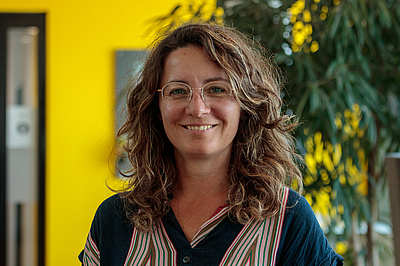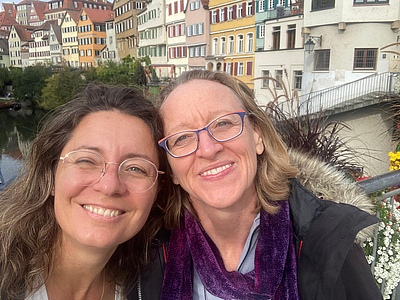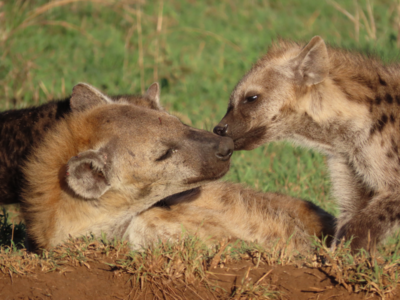Individual Synthesis Postdoc as a Puzzle Piece in a Successful Career
A Woman in Germany’s Science System
For a long time, I had no intention of making a career out of it. I just wanted to do research and work in the profession I chose to study. There are no other scientists in my family, so I was not naturally prepared for the academic system. I graduated from Johannes Gutenberg University at the age of 28 after a 4-year research stay in China. During my doctoral thesis, I encountered epigenetics for the first time and studied its mechanisms in the fruit fly. Epigenetics was still a very young field of research in the early 2000s. I really enjoyed working in molecular laboratories, but writing my doctoral thesis and my first publications in English was rather difficult for me at the time. After my doctorate, I did my first postdoc in Germany. I spent a total of 18 years as a postdoc, eight of which I financed myself by successfully applying for third-party funding applications. With the help of these applications for third-party funding, I was able to bypass the German Academic Fixed-Term Act, which only permits a 9-year time limit for internal institute funding. The projects were fun because they allowed me to work on my own ideas. However, as they were limited in time, there was pressure to succeed, so that the next projects had a chance of being funded and I could continue my scientific work.
Good project management is essential for the success of these projects, which I taught myself with the support of coaching sessions. This includes planning and managing finances, establishing methods in the lab and for data analysis, supervising students, expanding a network, regularly stepping in if something doesn't work and constantly solving problems. It was an exciting, challenging and long journey. In principle, these project applications and continuous coaching were my strategic career planning. Neither proposal writing nor third-party funding providers were covered during my studies; so I also attended events, familiarized myself with the subject and spoke to my colleagues. Particularly in early scientific careers, it is important to select funding sources with a high success rate, as well as co-applicants who have good publication record and are also supportive when writing.
When I saw the call for individual synthesis postdocs, which offered considerable research freedom and had a comparably light application process, I applied. In this call, sDiv funded three postdocs out of 32 applications and I was one of those successful ones. One of the decision-making criteria for my project was (next to the general quality, of course) that epigenetics hadn’t been addressed in any previously funded synthesis projects and that I found a very enthusiastic iDiv collaborator (Dr. Walter Durka). My 2-year sDiv synthesis project on interspecies epigenetics at iDiv gave me the opportunity to expand my knowledge to a cross-species analysis, to work with new cooperation partners and to expand my network. Together with Dr. Walter Durka, Prof. Christina Richards (University of South Florida, Tampa) and Dr. Marc Schmid, we are currently working on the revisions of a paper in which we are suggesting a strategy on how to combine genetics with epigenetics to study the adaptive potential. Together with my French collaborator Prof. Christoph Grunau, we wrote a book chapter on „Epigenetics in Evolution“ in a book for undergraduate students entitled „Explique-moi Epigénétique“.
When I saw the call for individual synthesis postdocs, which offered considerable research freedom and had a comparably light application process, I applied. In this call, sDiv funded three postdocs out of 32 applications and I was one of those successful ones. One of the decision-making criteria for my project was (next to the general quality, of course) that epigenetics hadn’t been addressed in any previously funded synthesis projects and that I found a very enthusiastic iDiv collaborator (Dr. Walter Durka). My 2-year sDiv synthesis project on interspecies epigenetics at iDiv gave me the opportunity to expand my knowledge to a cross-species analysis, to work with new cooperation partners and to expand my network. Together with Dr. Walter Durka, Prof. Christina Richards (University of South Florida, Tampa) and Dr. Marc Schmid, we are currently working on the revisions of a paper in which we are suggesting a strategy on how to combine genetics with epigenetics to study the adaptive potential. Together with my French collaborator Prof. Christoph Grunau, we wrote a book chapter on „Epigenetics in Evolution“ in a book for undergraduate students entitled „Explique-moi Epigénétique“.
Besides the project, sDiv enabled me to finish my manuscript on „Epigenetic signatures of social status in wild female spotted hyenas (Crocuta crocuta) “. I was part of the enthusiastic folks of EvoDiv (a group for scientists working on evolutionary biodiversity at iDiv) meetings and contributed to the EvoDiv conference. Since then, I have been collaborating with Prof. Anja Widdig (iDiv and Uni Leipzig) on a newly funded project on crested macaques (FlexPool). Furthermore, I traveled to conferences and collaboration partners, presented my work in several scientific talks, attended a workshop on methylation analysis, took part in 3 writing retreats and expanded my skills through several coachings. All this would not have been possible without the flexible and always friendly support of iDiv/sDiv by Dr. Marten Winter, Carolin Kögler and Isabella Maasberg.
The funding allowed me to bridge the time between a third-party funded project and a permanent position at my previous employer (IZW) and thus ultimately to continue my scientific work without risking being potentially unemployed. At the Leibniz Institute for Zoo and Wildlife Research in Berlin, Germany (IZW), I am now leading the Wildlife Epigenetics group within the Department of Evolutionary genetics, where we focus on epigenetic analysis on wild species in response to environmental conditions.
During my time at iDiv, together with three female iDiv colleagues (Sreetama Bhadra (sDiv), Daniela Hoss (sDiv), Gabriella de Faria Oliveira Damasceno Ribeiro (MLU)), we founded an initiative for women in science (iDiv female scientists), which was supported by the iDiv Female Scientist Career Fund, and now has more than 120 members. The open, highly international and scientific environment in my group at sDiv and generally at iDiv was a very enriching experience. A lot of work, a good sense of humor, perseverance and a good dose of luck were necessary on my path to succeed in science, especially as a woman.
Vullioud, C., Benhaiem, S., Meneghini, D., Szyf, M., Shao, Y., Hofer, H., East, M. L., Fickel, J., Weyrich, A.: Epigenetic signatures of social status in wild female spotted hyenas (Crocuta crocuta). Commun Biol7, 313 (2024). https://doi.org/10.1038/s42003-024-05926-y



